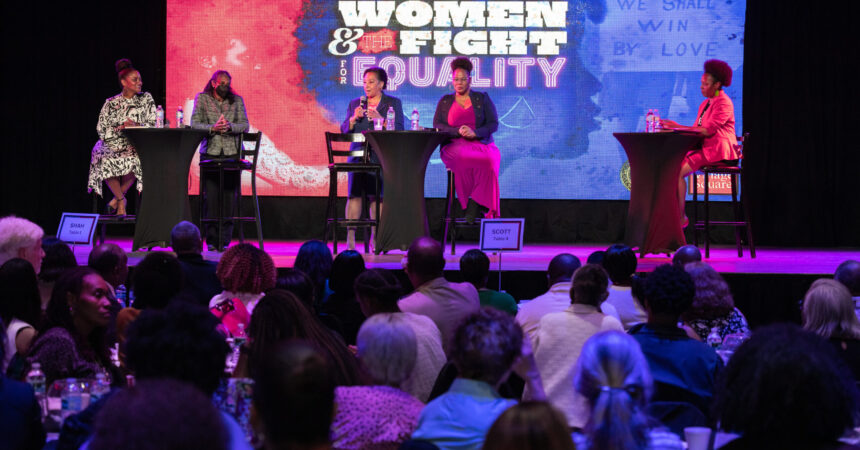
Panelists explain aspects of being Black women

Photo submitted by Leon County government

Photo submitted by Leon County government
By St. Clair Murraine
Outlook Staff Writer
Each of the female panelists lived some aspect of the four subjects they tackled relative to equity and equality.
For a little more than an hour, two women who each have decision-making roles at FSU and FAMU, a female medical doctor and another woman who is well-known for her community advocacy responded to pertinent concerns. Working from the topic “Created Equal: Black Women and the Fight for Equality,” they responded to challenges in healthcare, community leadership, education and economic opportunities.
“We felt that each one of those areas was an important part of the conversation and important for people to understand the unique struggles of Black women in those areas,” said Vanessa Rowse, executive director at The Village Square.
The event at The Moon last Thursday evening marked the eighth year that Leon County government collaborated with The Village Square to host a Created Equal conversation. This time it brought together a cross-section of professionals, including Dr. Temple Robinson, Chief Executive Officer at Bond Community Health Center; Tamara Bertrand-Jones, an associate Professor of Higher Education in the Department of Educational Leadership and Policy Studies at Florida State University; Shawnta Friday-Stroud, Vice President for University Advancement and Executive Director of the FAMU Foundation; and Christic Henry, a neighborhood advocate.
Nicole Everett, host of Conversations with Nicole, was moderator. Everett applauded the women for their matter-of-fact responses on the chosen topics. They spoke directly to the audience of a little more than 200.
“Black women needed to be affirmed in this way,” Everett said. “I can’t tell the number of women that I could hear saying we need more conversations like this. I’m very moved by that and I’m going to do my very best to grant that request.”
Passion and assertiveness rung through, especially in the way that Robinson responded to the question about being Black and having to navigate the healthcare system. Having trust in a provider, transportation and childcare are some of the challenges for Blacks women, she said.
Finding a provider who doesn’t discount a patient’s concerns and one “that does not think, ‘oh, a Black woman,’ ” Robinson said. “They can take anything. Pain doesn’t bother them. Nothing bothers them. They can do it all and they can take it all.”
After using some of her time to tell the audience about services available at Bond, Robinson said everyone is entitled to good healthcare.
“Access to quality healthcare is a civil right,” Robinson said. “It is your right as a Black woman to get quality healthcare. People are dying behind foolishness, meanness. Some people call it unconscious bias. Some of it people don’t want to know.”
The question about being a Black woman who has to navigate the educational system prompted Bertrand-Jones , Ph.D, to note that Black women have earned more masters, bachelors and doctorate degrees than Black men.
Pointing out that anything less than her best in the class was unacceptable to her mother, Bertrand-Jones said the standard should be the same for girls today.
“Instill resilience,” she said. “It instills drive and motivation, but it also can be pressure. Unnecessary pressure that we deal with when we enter new spaces or we enter spaces that were not designed for us.”
Friday-Stroud, Ph.D, was forthright in her response to the question of Black women in the business world. She reiterated that achieving in business requires learning “the rules of the game and you play them better than anybody else.”
However, she warned that success isn’t that straightforward.
“Just about the time you start to master them, they will change,” Friday-Stroud said. “You always have to recognize that the only constant is change. The moment you get complacent and think that I have arrived, it’s the moment you get passed up.”
She encouraged women to learn and assist others in the process, calling it essential.
“You can’t make it in the world, and definitely in the world of business by yourself,” she said.
Henry, a longtime community advocate who is best known for her work on the city’s south side, meticulously explained that a Black woman doing community work isn’t an easy undertaking.
Understanding the work is multifaceted, she said.
That includes “people not being okay with me being a Black woman in America,” Henry said. “It has meant reaffirming my identity; reaffirming myself; owning my brilliance in a way that’s authentic to me and being alright with the sister sitting next to me and saying ‘you are absolutely outstanding.”
Then, she went on to debunk a longstanding myth that all Blacks have common upbringings in a single-parent home.
All Black women aren’t alike she said, adding that “when you’ve met one Black woman, you’ve met one Black woman.”
She added: “Please don’t ask me about being raised by a single mama. My daddy was there every day; picked me up from school, dropped me off to school, called to make sure I was at school. I don’t know anything about being raised by a single mother, but I do have friends who know something about being raised by a single mother.”







